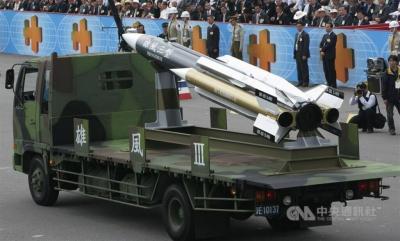The UK yesterday joined Taiwan, Japan and the US at a seminar in Taipei to commemorate the 10th anniversary of Japan’s Great Tohoku Earthquake, with participants highlighting the need to build resilience to natural disasters.
The seminar was part of the Global Cooperation and Training Framework (GCTF), which was established by Taiwan and the US in 2015, and engaged Japan as a cohost in 2019.
In his opening speech, Minister of Foreign Affairs Joseph Wu (吳釗燮) said the seminar is meaningful, because it was this year’s first GCTF event and the first time the UK joined the framework as a cohost.

Photo: CNA
In addition to representatives from Japan, the UK and the US, the seminar was attended by 110 officials and experts from 35 countries physically or virtually, the ministry said.
Japanese Representative to Taiwan Hiroyasu Izumi said the topic of the seminar, “Building the Resilience of Nations and Communities to Disasters,” was proposed by Japan.
Japan is prone to natural disasters, such as earthquakes and tsunami, so it puts great efforts into disaster prevention, he said.
In the wake of the March 11, 2011, earthquake and ensuing tsunami, Japan received support, exemplified by the US military’s “Operation Tomodachi,” as well as sizeable donations from Taiwan, the UK, the US and other countries, he said.
In addition to establishing measures to prevent and mitigate disasters, Japan has also shared its knowledge and technology with other countries, he said, adding that National Research Institute for Earth Science and Disaster Resilience president Haruo Hayashi gave a keynote speech at the seminar.
American Institute in Taiwan (AIT) Director Brent Christensen said he was proud to jointly host several workshops, including two under the GCTF, to train third-country practitioners from across the Indo-Pacific region on best practices in disaster relief.
Since the 921 Earthquake in 1999, Taiwan has worked hard to enhance its disaster response measures and become a model for disaster preparedness in the region, he said.
Christensen promoted the “Taiwan model” for managing COVID-19 and disaster response, encouraging other countries to also work more closely with Taiwan in disease prevention.
The UK’s approach increasingly integrates disaster risk reduction with other areas of development, such as climate change adaptation and social protection, British Representative to Taiwan John Dennis said, highlighting the need to obtain funding for the efforts.
British speaker Joanne Meusz is a true expert in this area as lead risk finance specialist for the British Centre for Disaster Protection, he added.
The seminar was also attended by Deputy Minister of Science and Technology Lin Minn-tsong (林敏聰), and National Science and Technology Center for Disaster Reduction Secretary-General Li Wei-sen (李維森).
Following yesterday’s opening, a series of meetings would take place through September, with most being held virtually, Li said.

STATS: Taiwan’s average life expectancy of 80.77 years was lower than that of Japan, Singapore and South Korea, but higher than in China, Malaysia and Indonesia Taiwan’s average life expectancy last year increased to 80.77 years, but was still not back to its pre-COVID-19 pandemic peak of 81.32 years in 2020, the Ministry of the Interior said yesterday. The average life expectancy last year increased the 0.54 years from 2023, the ministry said in a statement. For men and women, the average life expectancy last year was 77.42 years and 84.30 years respectively, up 0.48 years and 0.56 years from the previous year. Taiwan’s average life expectancy peaked at 81.32 years in 2020, as the nation was relatively unaffected by the pandemic that year. The metric

Taiwan High Speed Rail Corp. (THSRC) plans to ease strained capacity during peak hours by introducing new fare rules restricting passengers traveling without reserved seats in 2026, company Chairman Shih Che (史哲) said Wednesday. THSRC needs to tackle its capacity issue because there have been several occasions where passengers holding tickets with reserved seats did not make it onto their train in stations packed with individuals traveling without a reserved seat, Shih told reporters in a joint interview in Taipei. Non-reserved seats allow travelers maximum flexibility, but it has led to issues relating to quality of service and safety concerns, especially during

A magnitude 5.1 earthquake struck Chiayi County at 4:37pm today, the Central Weather Administration (CWA) said. The hypocenter was 36.3km southeast of Chiayi County Hall at a depth of 10.4km, CWA data showed. There were no immediate reports of damage resulting from the quake. The intensity of the quake, which gauges the actual effect of a seismic event, measured 4 in Chiayi County, Tainan and Kaohsiung on Taiwan's seven-tier intensity scale, the data showed. The quake had an intensity of 3 in Chiayi City and Yunlin County, while it was measured as 2 in Pingtung, Taitung, Hualien, Changhua, Nantou and Penghu counties, the data

The Supreme Court today rejected an appeal filed by former Air Force officer Shih Chun-cheng (史濬程), convicted of Chinese Communist Party (CCP) espionage, finalizing his sentence at two years and two months for contravening the National Security Act (國家安全法). His other ruling, a ten-month sentence for an additional contravention, was meanwhile overturned and sent to the Taichung branch of the High Court for retrial, the Supreme Court said today. Prosecutors have been notified as Shih is considered a flight risk. Shih was recruited by Chinese Communist Party (CCP) intelligence officials after his retirement in 2008 and appointed as a supervisor